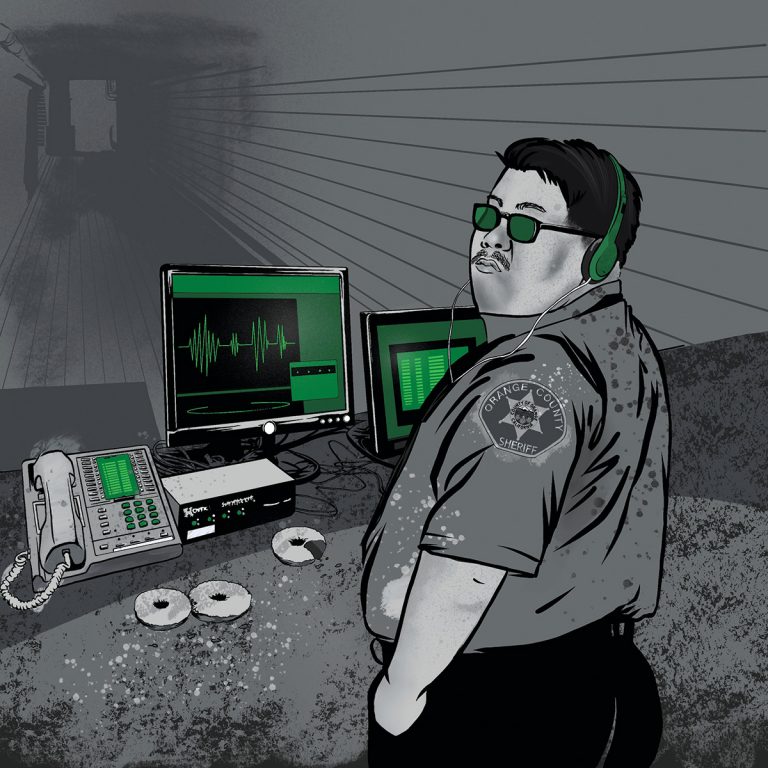Who Aided OC Sheriff in the Secret Monitoring of Attorney Client Phone Calls?
Illegal playlist (Illustration by Jouvon Michael Kingsby)For decades, the local population routinely accepted the word of Orange County Sheriff’s Department (OCSD) deputies as gospel. Reports of gruesome deputy beatings of inmates, sleeping on the job, using public equipment such as helicopters for personal use and federal corruption convictions of the agency’s top three officers didn’t permanently scar their reputations, perhaps because they were spun as isolated, freak events. But by February 2015, OCSD managers found themselves in a public-relations crisis that was winning embarrassing national headlines.
Evidence proved deputies and their supervisors systematically cheated the criminal-justice system for decades by aiding prosecutors in winning trials with underhanded tactics. They’d run unconstitutional scams using jailhouse informants to trick pretrial inmates into talking about their cases despite their right to remain silent. With juries kept in the dark, deputies hid or destroyed records of these plots. They’d even committed perjury as the coup de grâce in their slimy endeavors. Once caught in lies after swearing to tell the whole truth, deputies incredibly claimed they thought they had the right to pick and choose which questions to answer honestly on the witness stand.
It’s in that environment that seemingly unrelated events occurred in early 2015—which I’ll highlight after some necessary background. Reston, Virginia-based Global Tel*Link Corp. (GTL), OCSD’s handpicked monopoly for the lucrative jailhouse-phone system, upgraded its surveillance capabilities in January. In March, Superior Court Judge Thomas M. Goethals, disgusted by deputies’ lies in a death-penalty case, blasted their perjury and historically booted then-District Attorney Tony Rackauckas, as well as his entire staff, because he believed prosecutors were more concerned about winning than insisting on ethical law-enforcement operations.
In between those two events was hidden, until recently, the key moment to OCSD’s latest scandal. Freshman Sheriff Don Barnes didn’t want his era at the helm of the agency and its billion-dollar annual budget marred by scandals on par with the missteps of Sandra Hutchens, his predecessor and warped mentor. According to sources, Barnes hoped his fresh face, golly-gee quotes and towering, cowboy physique might allow him a fresh start. But it was impossible that some of Hutchens’ myriad of scandals, which Barnes dutifully participated in as second in command, wouldn’t spill over to the next top cop, which is precisely what happened with the GTL mess.
A fluke January 2018 discovery in a separately wild, questionable, ongoing attempted-murder prosecution in People v. Josh Waring revealed that tainted sheriff’s deputies and Costa Mesa cops had been recording, downloading and listening to calls the pretrial defendant made to his attorney, Joel Garson. As with using jail snitches as government agents to question OCSD targets before their trials, it’s illegal to violate attorney-client communications. Even graduates of community-college Policing 101 understand that fundamental Sixth Amendment principle.
But as the informant scandal underscored, too many OCSD deputies think neither the law nor common decency constrict their conduct. Fueling this duplicity is the belief they are shrouded in official secrecy and if, by chance, ugly facts escape containment, then local prosecutors will ignore transgressions. Newly elected, reform-claiming DA Todd Spitzer adopted Rackauckas’ policy of protecting dirty deputies. For example, in at least 145 cases, his deputy DAs have blocked defense-attorney access to records of moral turpitude committed by badged OCSD employees. That move helps maintain the fiction that deputies’ testimony and arrest reports are unquestionably righteous.
Because of the Waring revelations, GTL and OCSD panicked for differing reasons. One was concerned about its corporate credibility, its desire to keep 82 percent of the U.S. jail phone-call market and how to protect $1.2 billion in annual revenues. The other was Hutchens’ desire to avoid another controversy during her final year in power. Both spent half a year concocting seemingly plausible spins to downplay the violations of attorney-client communications. When the public began to hear about this cheating in August 2018, they were told the phone-call surveillance had been because of a benign technical glitch and that deputy access to the conversations hadn’t benefited law-enforcement cases.
Undermining those assertions have been glaring inconsistencies, flip-flops and common sense. Who was to blame? At first, a technical glitch was at fault. Then, it was “human error” by a nameless, mysterious employee, who—if this person exists—is being hidden from defense attorney questioning. Later, the glitch line returned. And finally, it was suggested client county departments had screwed up, according to GTL emails. But you’ll see by the end of this column it was all poppycock.
In late July 2018, Darren Wallace, GTL’s executive vice president for operations, sent Hutchens a letter that allegedly summarized the parties’ private discussions. Wallace wrote that the company “had recently discovered” the abuse of privileged attorney-client calls because of a “technical error.” He also claimed the mess had been fixed.
A month later, in Waring testimony, Wallace pointed to a “human error” as the cause. He also stated he’d written the letter to the sheriff on his 11th day on this particular GTL assignment and noted it was his first official act. But in truth, he wasn’t the author. The man who wrote the basic contents of the letter to OCSD had been George McNitt, GTL’s Fort Worth-based vice president of technical services.
Why conceal that fact? Because admission of McNitt’s authorship role would have belied the claim that GTL had “recently discovered” the supposedly new problem in Orange County. He’d crafted the letter three years and four months earlier to the Charlotte County Sheriff’s Office in Florida, according to records reviewed by the Weekly. A prosecutor there had discovered that hundreds of attorney-inmate calls had been accessed by deputies and, honorably, complained.
Both the 2018 Wallace-signed letter and the 2015 McNitt-signed letter argue the same point: breaking the attorney-client privilege had been unintentional, whether in California or Florida or anywhere else they’ve botched affairs.
But recall early 2015. GTL installed its new phone system in January. Two months later, OCSD officials felt the blistering rebuke of a judge. Wedged between those two events were bombshell February moves behind the scenes that indicate the phone monitoring might not have been innocent after all.
On Feb. 23 of that year, someone oddly made calls from two OC jail facilities to the IT Department of the Orange County Public Defender’s Office (OCPD). Even more puzzling, Larry Coleman, an on-site technician who handled GTL issues for OCSD, accessed one of those bizarre calls.
Had Coleman confirmed deputies could monitor pretrial inmate calls to public defenders without detection?
Adil M. Khan, a Los Angeles-based lawyer for GTL, this month labeled such questions “conspiracy theories.” Khan says we should trust the company’s current wobbly accounting. He hopes Superior Court Judge Gregg L. Prickett, a former prosecutor, will block public defenders Sara Ross and Scott Sanders from asking GTL employees future questions or obtaining more GTL documents. Otherwise, the government contractor would be put in an “unfair” situation, he says.
Yet, it’s fascinating that just hours after Coleman’s 2015 call to the OCPD’s IT Department, sheriff’s Special Handling Deputy Blake Blaney began unethically accessing inmate calls to OCPD lawyers—and the company did nothing to stop it, court records indicate.
According to Sanders, “It appears circumstantially strong that Coleman actually gave the Special Handling Unit the ‘all clear’ sign to access privileged calls.”
CNN-featured investigative reporter R. Scott Moxley has won Journalist of the Year honors at the Los Angeles Press Club; been named Distinguished Journalist of the Year by the LA Society of Professional Journalists; obtained one of the last exclusive prison interviews with Charles Manson disciple Susan Atkins; won inclusion in Jeffrey Toobin’s The Best American Crime Reporting for his coverage of a white supremacist’s senseless murder of a beloved Vietnamese refugee; launched multi-year probes that resulted in the FBI arrests and convictions of the top three ranking members of the Orange County Sheriff’s Department; and gained praise from New York Times Magazine writers for his “herculean job” exposing entrenched Southern California law enforcement corruption.
CITED FROM https://www.ocweekly.com/ocsd-global-tel-gtl-jail-phone/



